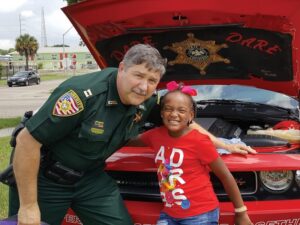Captain Randy Aguillard, with the East Baton Rouge Sheriff’s Office, has been teaching kids to “make safe and healthy choices” for 25 years. He is the supervisor of the D.A.R.E. program, which stands for Drug Abuse Resistance Education, and the program was implemented in EBR in 1994. Now, the program reaches about 45 different local schools and thousands of students each year.
D.A.R.E. began in Los Angeles in 1983 when the Los Angeles Police Department and the Los Angeles Unified School District partnered to create a drug resistance education program for elementary schools. They realized that law enforcement alone could not solve the drug issues the city was seeing. By 1989, D.A.R.E. America was established as a national nonprofit organization and quickly began to grow and adapt to meet the needs of schools across the US.
“My biggest goal is teaching decision-making,” Captain Aguillard says. “Peer pressure is really bad in middle school, so decision-making skills are very important for them.”
As stated on the EBR Sheriff’s Office website, “Elementary school children lack sufficient social skills to resist peer pressure and to say no to drugs. D.A.R.E. instructors do not use the scare tactics of traditional approaches that focus on the dangers of use. Instead, the instructors work with children to raise their self esteem, teach them how to make decisions on their own, and help them to identify positive alternatives to substance abuse.”
During a lesson, children are broken into groups and given different stories about things like bullying, drugs, and stealing, Captain Aguillard says. Then, they are asked to go through the Dare Decision Making Model: define, assess, respond, evaluate.
“You want them to discuss because each student might approach the situation differently,” Captain Aguillard says. “Make them think! Which choice is a good choice and why?”
Captain Aguillard explains that each officer who teaches D.A.R.E. has his or her own stories about kids coming back, saying how they got their mom or dad to quit smoking. Plus, some of the children Captain Aguillard taught previously, are now teachers in the classrooms, helping him and the other officers shape the minds of more children.
D.A.R.E. has the biggest impact when the triangle of police, schools, and parents work together to promote the same message. This is why Captain Aguillard is passionate about parent involvement after school lessons have been taught.
“People want to give me credit, but it’s all three of us coming together,” says Captain Aguillard. “You have parents saying, ‘Who is this guy my kid is talking about who made me quit smoking?’ Then, they come and have a conversation. The stuff I’m saying is what a parent would say, but it’s coming from a third party.”
Captain Aguillard believes D.A.R.E. will remain a necessary component of school education for our children because new issues will always arise. He says, “The world keeps changing, and they keep trading one bad thing for another. D.A.R.E. will always be around to help them make good choices.” ■





